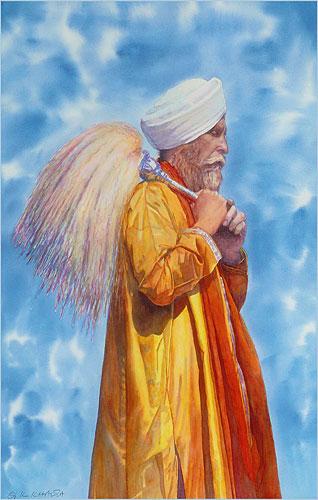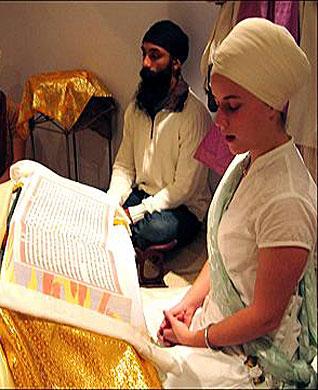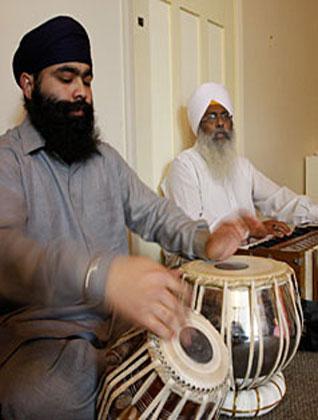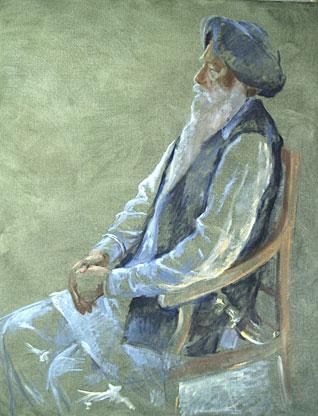
Above and homepage image: "Granthi" by GuruKirn Kaur Khalsa. Below, first from bottom: "Granthi" by Enrica Melotti. Third from below: photo by Gurumustuk Singh.



Faith
Dawn to Dusk:
A Day in the Life of a Granthi
by MERVYN DYKES
There is a house of worship in Palmerston North (New Zealand) that never closes and for its caretakers - "granthis" - their long day begins at night.
Long before dawn, the granthi starts his spiritual duties at the gurdwara (as a Sikh church is known) on Amesbury Street, Palmerston North. There is much to do before the first of the worshippers are received and most of it involves the 1430-paged holy scripture, the Guru Granth, which is ceremonially installed at dawn and closed at dusk as The Living Word.
For Giani Sarindar Singh and Giani Manjeet Singh, the days can be long because the gurdwara never closes.
Flying outside is a yellow triangular flag of the Sikh nation, signifying that the gurdwara is a house of God that will receive anyone, Sikh or non-Sikh, who is devout, seeking God's peace, or in need of assistance.
It could be a traveller looking for shelter, or perhaps someone in need of food from the free kitchen.
"It [the gurdwara] is open to anyone who needs a place," says Sarindar Singh.
He hails from Penang in Malaysia and, like other granthis, is married with a family to open him up to life's experiences and to help him better understand the roles, duties and obligations of members of the sangat (congregation).
His path to becoming a granthi began with a university education. He then worked at a university for 16 years and at one point he served as an HIV counsellor. Once he had decided that his way ahead meant doing what he could to help others, he completed two years of study to become a granthi.
He has since served in the United Kingdom, Canada, the United States of America, Australia, Korea, Thailand, Brunei, Indonesia, Singapore, Japan, India, and now, New Zealand.
A large part of his work in Malaysia was with youth, organising religious games and sports. Many of the young people no longer understood their mother tongue's religious form (which has its origin five centuries ago), and had therefore become disconnected from their religion, he says.
Often held during holidays, the games attracted as many as 2000 youngsters in Malaysia, and 500 in Bangkok, Thailand.
Hundreds more young Sikhs attended camps in Perth, Australia, where again it became evident that in a predominantly English-speaking country they had not been taught Punjabi and had become disconnected from what was being taught at the gurdwara, says Sarindar Singh.
Now in some areas, such as Indonesia and Thailand, more of the instruction is being given in English than Punjabi.
The biggest day of worship in Palmerston North is Sunday, says Sarinder Singh. Anywhere from 40 to 150 people could attend and there are signs that the Sikh community is growing. Attempts are now being made to provide additional worship opportunities for people whose jobs make Sunday attendance difficult.
For the granthi, the work does not stop with the congregation, but also reaches out into the wider community in the hope of establishing greater harmony in society. As with Christian religions, Sikhs believe that God is love and that love is essential for harmonious relationships.
"It is like a tree," he says. "The root is God and the religions are its branches, but if there is no root, there is no tree."
Christians, Muslims, Hindus, Jews and Sikhs are all welcome at the gurdwara, provided they come in the name of God's love and are prepared to respect differences.
"It is good to have religious understanding rather than 'religious' wars."
Sarindar Singh's title of granthi comes from Guru Granth (granth, literally, means the book or the Holy Scripture; hence granthi means one who attends the Guru Granth ).
In the most basic sense, he or she deals with a variety of aspects of the Guru Granth: its parkaash (installation every morning at dawn), semaapti (closure at dusk), and paatth (its reading, rendering, interpretation and teaching), to the congregation. He is in attendance to the Guru Granth at all times through hymns, prayers and simran (meditation).
As a granthi, he leads the congregation in prayer, performs kirtan (musical rendition of hymns from the Scripture), the kathaa (discourse), ardaas (congregational prayer), and is expected to inspire and provide spiritual direction and upliftment to the congregation.
He performs all the Sikh ceremonies, from birth and baptism to death.
He provides spiritual counselling to individuals and families and acts as a teacher and role model.
Much of his time is spent teaching children, young adults and adults about kirtan (spiritual music), tabla and harmonium (musical instruments), Gurbani (verses from the Scripture), the Punjabi language and the accompanying Gurmukhi script.
Perhaps the most important educational qualification relates to classical music with a specialization in vocals, raags (musical scores) and tabla taals (musical rhythms). This is because the Sikh Scripture is entirely written in poetry, complete with recommended musical scores and rhythms.
Besides strong vocal skills, the granthi must have expertise in such musical instruments as the harmonium, mandolin, rebab, sitar, and tanpura (a four-stringed lute).
When Sarindar Singh bows to the holy book, he is not worshipping it, but honouring the Word of God it contains. And his presence and that of the gurdwara is considered a blessing by the congregation.
THE GURU'S SIKHS ARE STUDENTS OF TRUTH
Five hundred years ago, the followers of the founder of Sikhism, Guru Nanak, were called "Sikhs", which literally means "students of truth". He taught them to bow only before God and to link themselves to the Shabad Guru, or the Light of Truth embodied in the faith's Scripture.
The aims of a Sikh are:
To train the mind and all the senses to recognise the Divine Light within oneself and within all of creation; and
To be of service to others.
Sikhs believe we received a human body so we could experience the Divine Light in ourselves and in everything around us. This is said to generate bliss, compassion, fearlessness and love, and to provide a way to face life honestly, with courage and grace.
These are considered the foundations of a world filled with peace, prosperity and integrity.
EDITOR'S NOTE: A man or a woman can be a granthi. A granthi is not to be equated with a "priest" - any form of priesthood is strictly prohibited in Sikhism. A granthi serves as an elder and a caretaker, but enjoys no special status or privileges above that of any other observant Sikh.
[This is an edited version of the article which first appeared in The Manawatu Standard]
Conversation about this article
1: Gurdip Chana (London, U.K.), July 15, 2009, 7:45 AM.
Very well written piece - how refreshing to understand the 'true' nature of what a Granthi stands for. Such information should be distributed in all gurdwaras across the world to demonstrate to any ill-informed Sikhs about the true nature of Sikhi and what Sikhi stands for.


